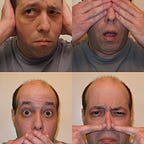Personal Passover
Some weeks ago I wrote a piece in which I argued that religion helps to fulfill a basic human need for mythology to frame and process a world in which we are all subject to a great many inscrutable phenomena. As Shakespeare put it: “There are more things in heaven and Earth, Horatio, / Than are dreamt of in your philosophy.” The universe is too broad, too deep, too vast for our puny little minds to encompass. Therefore, we invent myths to help explain the inexplicable. Our myths frequently contain valuable truths, but we invariably run aground when we insist that they represent The Singular Truth.
Consider, for example, the upcoming Passover. We can mine this story for many truths. As a myth it is many-faceted and can be applied to countless individual situations. But to assert that the Book of Exodus represents an historical account is dubious in the extreme. To begin with, there is no archaeological evidence that the Jews, as a people, were ever enslaved in Ancient Egypt. There is, likewise, no evidence of the Jewish people traipsing across the wilderness of the Sinai Peninsula for 40 years. There is, in fact, no substantive evidence to support the narrative that the Jews conquered Canaan, nor even that the “Nation of Israel” was a cohesive, monolithic tribal/political body of sufficient size and force to have acted in such a coordinated manner. Although there has been some scanty evidence supporting the historical existence of some of the kings mentioned in the Jewish Bible, the actual extent of their kingdoms and power is a subject of ongoing debate. What is certain is that there is no archaeological evidence to support the existence of the succession of judges which, according to the Bible, predated the kings, let alone an historical figure named Moses predating the judges. Even if there were evidence to support the existence of such a personage, scholars are certain that he could not, by any means, have been the author of the Torah, which dates to a much later period.
What value, then, does the myth of the Passover hold? Quite a bit, actually. As it turns out, the narrative of the Passover is heavily imbued with significance. Consider the following example from my own life.
I was once addicted to cigarettes. It was a dangerous, despicable habit which I picked up when I was far too young to appreciate the consequences, and by the time I did understand them, I was deeply addicted. Nicotine addiction was my bondage in Egypt. Who was Pharaoh? I was. Every time I considered releasing myself from the bondage of addiction something would harden my heart.
Were there plagues? Were there ever!
The First Plague was the cost of smoking, draining my wallet day after day. But that wasn’t enough to stop me. The Second Plague was the social stigma of smoking, the dirty looks of those who passed me on the sidewalk coughing ostentatiously. But that wasn’t sufficient either. The Third Plague was the inconvenience of having to go outside in the cold, in the rain, in the wind, in the snow. The Fourth Plague was the stench of smoke clinging to my clothes, sinking into my car’s upholstery, ever-present on my fingers. The Fifth Plague was my sense of taste and smell which were so utterly compromised that I could no longer truly enjoy my food. The Sixth Plague was the need to always know where I could buy a pack of cigarettes when I ran out, even if that meant getting into my car at one in the morning. The Seventh Plague was the effect on my appetite, since nicotine is an appetite suppressant. The Eighth Plague was the worry I caused to my family and friends, and especially the disapproval of my parents. The Ninth Plague was the burn marks which marred my clothes, my car, and even my furniture. But none of these was sufficient to make me quit.
It took one final Plague to convince me. The Tenth Plague was my very health. It was the hacking cough. It was the short-windedness which comes from years of smoking. It was the fear of lung cancer, the fear of heart disease, the fear of emphysema. I didn’t finally release myself from bondage until I feared for my life. And then? Then I faced my own 40 years in the wilderness: a long period of withdrawal symptoms and readjustment as I learned to live without the familiar routines of smoking. The good news is that I made it to the Promised Land, and have lived there happily for many years now.
This is just one small example of how a myth in a religious text can have significant applicability in the real world. There are many forms of bondage that people struggle with throughout their lives. If, instead of viewing a story such as the Passover as an historical account, we choose to view it as a myth, it can help us to understand our own struggles. It can help us to frame our own stories. In doing so, it can also strengthen us.
